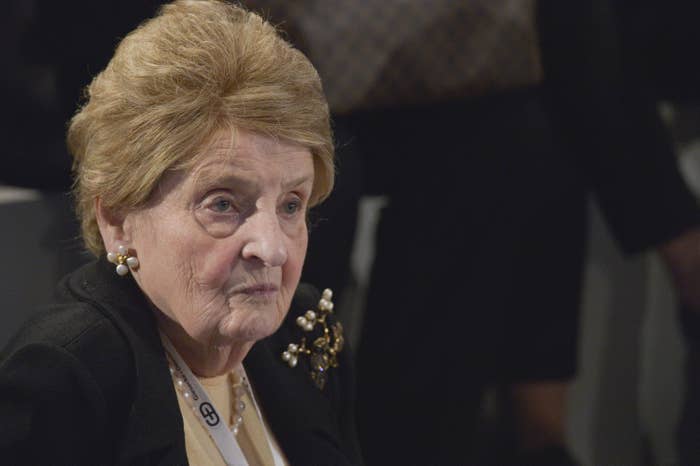
Madeleine Albright, who served for four years as the first woman secretary of state, has died, her family announced Wednesday. She was 84.
Albright served as the country's top diplomat from 1997 to 2001 under former president Bill Clinton.
Clinton called Albright "one of the finest Secretaries of State, an outstanding UN Ambassador, a brilliant professor, and an extraordinary human being."
"Madeleine's passing is an immense loss to the world in a time when we need the lessons of her life the most," the former president said in a statement. "Hillary and I will always be deeply grateful for her wonderful friendship we shared and the unfailingly wise counsel she gave us over so many years."
In a statement, her family said the cause of death was cancer.
"She was surrounded by family and friends," the statement added. "We have lost a loving mother, grandmother, sister, aunt, and friend."
Albright was the face of US diplomacy under the Clinton administration in the ’90s, serving as US ambassador to NATO before becoming secretary of state. But even near the end of her life, she was an active presence in diplomatic circles.
"A tireless champion of democracy and human rights, she was at the time of her death a professor at Georgetown University's School of Foreign Service, chair of Albright Stonebridge Group, part of Dentons Global Advisors, chair of Albright Capital Management, president of the Harry S. Truman Scholarship Foundation, chair of the National Democratic Institute, chair of the U.S. Defense Policy Board, and an author," her family said.
Born Marie Jana Korbel in Prague, her family fled to England during World War II. Albright believe that her family had fled for political reasons, but the Washington Post uncovered in 1997 that she had Jewish relatives, including three grandparents who were killed in the Holocaust. Albright had been raised Catholic and was later a practicing Episcopalian, the Post reported.
Her family would later return to Czechoslovakia after the war, but fled once again as the Soviet Union tightened its grip in the region, leading the family to settle in the United States in 1948.
She later changed her name to "Madeleine" and become a US citizen in 1957.
She graduated with a degree in political science from Wellesley College in 1959 and a PhD in public law and government from Columbia University.
Her first stint in the White House was from 1978 to 1981 as a member of the National Security Council under former president Jimmy Carter. She returned in 1993 under Clinton as ambassador to the United Nations.
As secretary of state, Albright pushed for the eastward expansion of NATO toward countries that were once under the umbrella of the Soviet Union. In 1999, for example, she supported NATO military action in Yugoslavia in response to the ethnic cleansing of Albanians in Kosovo.
"So many people around the world are alive and living better lives because of her service," former Sec. of State Hillary Clinton tweeted.
It was her personal experience, fleeing her home twice under the threat of Nazism and later the Soviet Union, that defined her role on the world stage for most of her life, former President Bill Clinton said in a statement.
"Few leaders have been so perfectly suited for the times in which they served," the statement read. "Because she knew firsthand that America's policy decisions had the power to make a difference in people's lives around the world, she saw her jobs as both an obligation and an opportunity."
Even to her last days Albright remained vocal, Clinton said, "supporting Ukraine in its fight to preserve freedom and democracy."
My statement on the passing of Madeleine Albright—one of the finest Secretaries of State, an outstanding UN Ambassador, a brilliant professor, and an extraordinary human being.
Former president Barack Obama, in a statement, noted it was Albright's experience as an immigrant and a refugee that helped to refine her perspective world politics.
"As an immigrant herself, she brought a unique and important perspective to her trailblazing career," Obama wrote.
The former president recalled how during a naturalization ceremony, an Ethiopian man remarked how, "Only in America could a refugee from Africa meet the Secretary of State."
According to Obama, Albright replied: "Only in America could a refugee from Central Europe become Secretary of State."
As a diplomat, Albright was also known to adopt both gentle and firm tactics on the world stage.
Albright was known for wearing pins and at times chose specific jewelry to make a statement or set the tone of her meetings with world leaders. Many of them are now on display at the National Museum of American Diplomacy.
In 1997, for example, Saddam Hussein's "poet-in-residence" called Albright "an unparalleled serpent" ahead of her meeting with the Iraqi leader, she recalled in an article for the US Embassy in Luxembourg. When she met with Hussain, she wore a golden pin of a serpent wrapped around a branch and a diamond dangling from the snake's mouth.
During a 2000 summit between Clinton and Vladimir Putin, the Russian leader mentioned that he regularly checked Albright's jewelry to figure out its meaning.
Albright, recalling the story, said Putin then asked why that day she was wearing a brooch with three monkeys covering their eyes, mouth, and ears, known as the "Hear No Evil, Speak No Evil, See No Evil" pin.
"I responded that it was because of Russia's heavy-handed approach in Chechnya, which included significant human rights violations," she said.
“Putin became furious, President Clinton looked at me in disbelief, and I feared I had jeopardized the summit,” she added. “Looking back, I am proud I wore the ‘evil’ pins.”
This is a developing story. Check back for updates and follow BuzzFeed News on Twitter.
